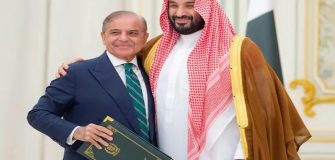ISLAMABAD (Urdu Times) Pakistan Saudi Arabia Defense Agreement; A reflection of economic, strategic, trade relations
Share
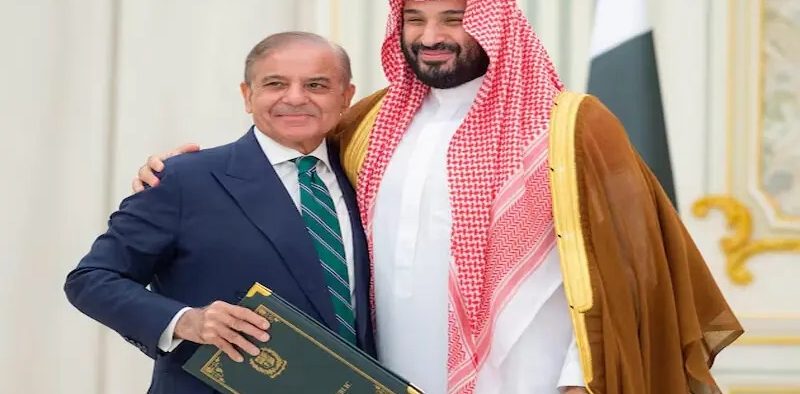
ISLAMABAD (Urdu Times) Pakistan Saudi Arabia Defense Agreement; A reflection of economic, strategic, trade relations The people of Pakistan have always been willing to sacrifice their lives in the defense of the two holiest places. This agreement reflects these same sentiments. A historic defense agreement was also signed between Pakistan and Saudi Arabia on September 17 last month. The agreement was signed during Prime Minister Shehbaz Sharif’s visit to Riyadh. Prime Minister Shehbaz Sharif says that Pakistan highly values the recent joint defense agreement with Saudi Arabia, which will further promote the economic, strategic, defense and trade relations between the two countries. According to a post on X Account, the Prime Minister of Pakistan was met by the Chairman of the Saudi Shura Council, Dr. Abdullah bin Muhammad bin Ibrahim Al-Sheikh, along with a delegation. The meeting was attended by Deputy Prime Minister and Foreign Minister Senator Muhammad Ishaq Dar, Speaker of the National Assembly Sardar Ayaz Sadiq, Federal Minister for Religious Affairs Sardar Muhammad Yousaf and relevant senior officials. The Prime Minister welcomed the delegation’s visit to Pakistan and described the meeting with Dr. Abdullah bin Muhammad bin Ibrahim Al-Sheikh as pleasant like his previous meetings with him in Riyadh and Jeddah. During the meeting, the Prime Minister conveyed his best wishes to the Saudi King, Custodian of the Two Holy Mosques King Salman bin Abdulaziz Al-Saud, and prayed for his health and well-being. The Prime Minister said that Pakistan highly values the recent joint defense agreement with Saudi Arabia, which will further promote the economic, strategic, defense and trade relations between the two countries. On this occasion, the Prime Minister said that the vision of Saudi Crown Prince and Prime Minister Prince Mohammed bin Salman for the development of Saudi Arabia is commendable. Under his leadership, Saudi Arabia has set an example of perfect development in every field, which is an example to be followed by the rest of the world. Exemplary steps have been taken for the development of the economic and social sectors and the empowerment of women. On this occasion, the Chairman of the Saudi Shura Council thanked him for the wonderful hospitality he received on his visit to Pakistan. He described the recent joint defense agreement between Pakistan and Saudi Arabia as very important and said that this agreement is a reflection of the long-standing brotherly relations between the people of the two countries. He stressed the importance of further strengthening parliamentary relations between the two countries. The leaders agreed to promote exchanges of parliamentary delegations between Pakistan and Saudi Arabia.
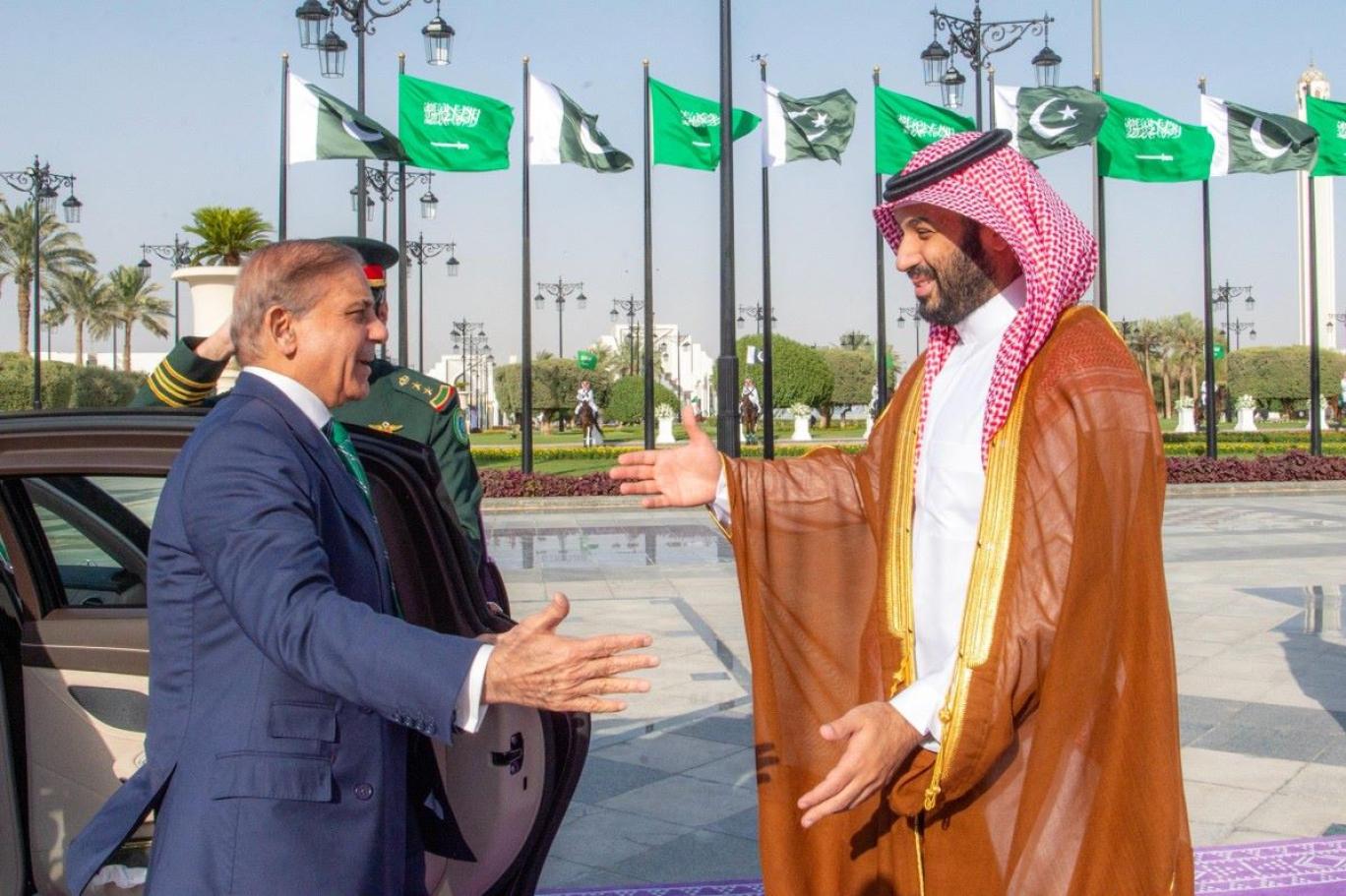
The exchange of delegations and meetings between Pakistan and Saudi Arabia indicate that both countries are rapidly moving towards their respective goals. Under the leadership of Prime Minister Shehbaz Sharif, there is a warmth between the two countries. Prime Minister Shehbaz Sharif had specifically mentioned Saudi Arabia in his first speech in 2024 and talked about giving a new economic direction to relations between the two countries. The personalities included in the delegations from Saudi Arabia are convinced that the time has come to fulfill the economic promises made in the past years. For this, it was necessary that a practically stable government was in place in Pakistan. The exchange of Saudi and Pakistani delegations was cemented by Prime Minister Shahbaz Sharif’s first visit to Saudi Arabia in Ramadan 1445 AH, and the recent Saudi delegation’s visit is progressing, and it can be said that this visit will prove to be a precursor to the arrival of Saudi Crown Prince Muhammad bin Salman to Pakistan. It is not far-fetched that the possible visit of the Saudi Crown Prince will involve further cooperation and there is also a need to explore new dimensions in economic cooperation and work on them. Extensive multilateral cooperation is possible in Pak-Saudi relations. There is a need for experts in both countries to explore these new dimensions and take steps forward. The Prime Minister of Pakistan said in a meeting with the Chairman Saudi-Pakistan Business Council that the relations between the two countries will be further strengthened on the basis of business and investment. In his address at the luncheon, Shahbaz Sharif said that ‘Saudi Arabia has supported Pakistan in every difficulty and the Pakistan-Saudi Arabia defense agreement is a formal form of brotherly relations. A 15-member Saudi Arabia trade delegation for the economic and trade promotion of Pakistan-Saudi Arabia According to the Foreign Office of Pakistan, Deputy Prime Minister and Foreign Minister Muhammad Ishaq Dar met with Prince Mansoor bin Muhammad Al Saud, Chairman of the Saudi-Pakistan Joint Business Council, in which Ishaq Dar expressed satisfaction over the growing momentum in bilateral economic relations and highlighted the vast possibilities of further cooperation between the two countries. On the occasion of lunch, the Chairman of the Pakistan-Saudi Arabia Joint Business Council, Prince Mansoor bin Muhammad Al Saud, said that he had met all the important ministers of Saudi Arabia before coming to Pakistan and informed them about the possible strategic projects in Pakistan. Prince Mansoor bin Muhammad Al Saud said that facilities will be provided to the Saudi business community to invest in Pakistan.
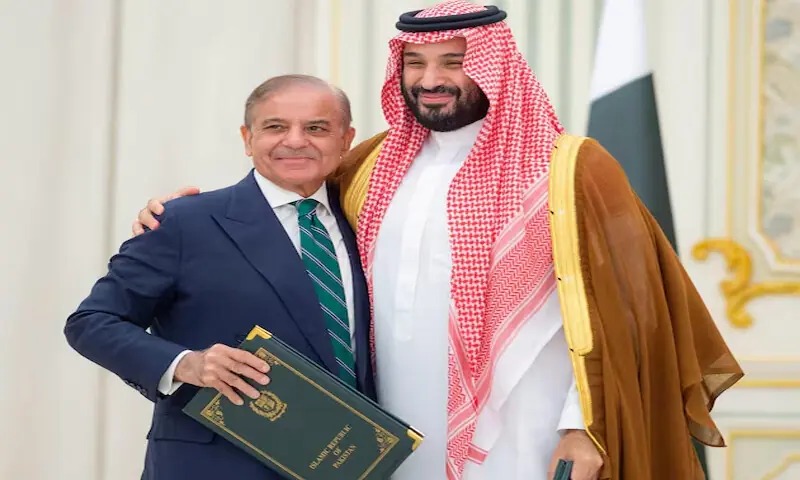 Prime Minister Shehbaz Sharif said in his address that the relations between Pakistan and Saudi Arabia will be further strengthened on the basis of business and investment. Saudi officials are also very excited about signing agreements between the two countries.Prime Minister of Pakistan said, “We are true brothers and a brother always comes to the aid of a brother. The Saudi brothers have always expressed unparalleled love for Pakistan.” The business delegation will also meet with the Special Investment Facilitation Council (SIFC) established to promote investment during its two-day visit. The meetings will discuss investment opportunities in various sectors including energy, information technology, agriculture, financial services, construction, semiconductors and the food industry. A 15-member Saudi Arabian trade delegation has arrived in Pakistan to promote economic and trade relations between Pakistan and Saudi Arabia. During the visit, the discussions will focus on trade, investment, cooperation in priority sectors as per Saudi Vision 2030 and Pakistan’s economic development agenda. The delegation is being led by Prince Mansoor bin Mohammed Al Saud. The delegation includes business figures and industrialists. This visit reflects the deep and brotherly relations between Pakistan and the Kingdom of Saudi Arabia and their shared commitment to enhance economic and investment partnership under the framework of the Saudi-Pakistan Joint Business Council. The trade delegation will also hold meetings with the Special Investment Facilitation Council (SIFC), established in Islamabad to promote investment. The meetings will discuss investment opportunities in various sectors including energy, information technology, agriculture, financial services, construction, semiconductors and the food industry. Last October, a 135-member Saudi business delegation visited Pakistan, in which Al-Baik and other projects were signed. This visit is taking place after the Pakistan-Saudi Strategic Mutual Defense Agreement signed on September 17, however, according to official sources, the agenda of the delegation is purely economic in nature. In this context, the Prime Minister of Pakistan has also formed a high-level committee before the visit. On the other hand, a delegation of the Saudi Shura Council also reached Islamabad on Monday. Abdullah bin Muhammad bin Ibrahim Al-Sheikh is visiting at the invitation of the Speaker of the National Assembly, Sardar Ayaz Sadiq. The federal government has formed an 18-member high-level committee in continuation of the historic defense and economic agreement between Pakistan and Saudi Arabia. According to the statement, the objective of this committee is to lead economic negotiations between the two countries under the Pakistan-Saudi Arabia Economic Framework. The committee will be co-chaired by Federal Minister for Climate Change Senator Mosaddeq Masood Malik and National Coordinator of the Special Investment Facilitation Council Lieutenant General Sarfaraz Ahmed. The committee members will also visit Saudi Arabia this month, in which mutual progress will be made regarding the agreement. In October last year, Pakistan and Saudi Arabia signed 27 MoUs worth $2.2 billion in various sectors including industry, agriculture, information technology (IT), food, education, mining and minerals, health, petroleum, energy and other areas of mutual cooperation. Following these trade agreements, Saudi Aramco, the world’s largest oil producer, has already started business activities in Pakistan, marking the beginning of a new era in economic relations between the two countries. To expand trade relations, the Pakistan Saudi Business Forum was also held in Islamabad, due to which the trade volume between Saudi Arabia and Pakistan, which was $5.12 billion, increased to about $5.5 to $6 billion annually in the last one year. The government of Pakistan has formed a high-level committee to advance bilateral economic relations and negotiations with Saudi Arabia. According to a notification issued by the Prime Minister’s Office, the committee will be co-chaired by Minister for Climate Change Mosaddiq Masood Malik and Lieutenant General Sarfaraz Ahmed, National Coordinator for the Special Investment Facilitation Council (SIFC). This is a civil-military body that monitors foreign investment. In the last few months, Pakistan has intensified efforts to strengthen trade and investment relations with friendly countries, especially Saudi Arabia. Saudi Arabia has promised an investment package of five billion dollars for Pakistan. The notification said, “The joint chairpersons will form core/negotiation teams for negotiations with their Saudi counterparts.” These teams will be responsible for the speedy implementation and enforcement of the assigned responsibilities. According to the notification, all members and representatives should ensure their availability from October 6 and the Prime Minister has directed that the travel approvals of SIFC members be completed within one hour on the same day. The committee was directed to submit a 15-day progress report to the Prime Minister, while the SIFC Secretariat will provide administrative support. Other members of the committee include Minister for Economic Affairs Ahad Khan Cheema, Minister for Energy Owais Leghari, Minister for Commerce Jam Kamal Khan, Minister for National Food Security and Research Rana Tanveer Hussain, Minister for Communications Abdul Aleem Khan, Minister for Information Technology and Telecommunication Shaza Fatima Khawaja and Special Assistant to the Prime Minister on Industries and Production Haroon Akhtar Khan. In addition, Pakistan’s Ambassador to Riyadh Ahmed Farooq, SECP Chairman Akif Saeed and State Bank Deputy Governor Dr. Inayat Hussain will also be part of the committee. The committee will also include the State Bank of Pakistan, Federal Board of Revenue, and Securities and Exchange Commission of Pakistan to ensure comprehensive coordination.The committee members will visit Saudi Arabia this month, which will see mutual progress on the agreement. In October last year, Pakistan and Saudi Arabia signed 27 MoUs worth $2.2 billion in various sectors including industry, agriculture, information technology (IT), food, education, mining and minerals, health, petroleum, energy and other areas of mutual cooperation. The Pakistan Saudi Business Forum was also held in Islamabad to expand trade relations. The trade volume between Saudi Arabia and Pakistan was $5.12 billion, which was between about $5.5 to $6 billion annually in the last one year. The Ministry of Commerce said, “The delegation includes prominent businessmen and industrialists. The trade delegation will meet SIFC officials. During the meetings, investment opportunities in various sectors including energy, information technology, agriculture, financial services, construction, semiconductors and the food industry will be discussed. Islamabad’s focal person for relations with Saudi Arabia, Musaddiq Malik, says that Pakistan’s recently signed defense agreement with Saudi Arabia is similar in nature to a NATO-style agreement based on a ‘comprehensive spectrum’.
Prime Minister Shehbaz Sharif said in his address that the relations between Pakistan and Saudi Arabia will be further strengthened on the basis of business and investment. Saudi officials are also very excited about signing agreements between the two countries.Prime Minister of Pakistan said, “We are true brothers and a brother always comes to the aid of a brother. The Saudi brothers have always expressed unparalleled love for Pakistan.” The business delegation will also meet with the Special Investment Facilitation Council (SIFC) established to promote investment during its two-day visit. The meetings will discuss investment opportunities in various sectors including energy, information technology, agriculture, financial services, construction, semiconductors and the food industry. A 15-member Saudi Arabian trade delegation has arrived in Pakistan to promote economic and trade relations between Pakistan and Saudi Arabia. During the visit, the discussions will focus on trade, investment, cooperation in priority sectors as per Saudi Vision 2030 and Pakistan’s economic development agenda. The delegation is being led by Prince Mansoor bin Mohammed Al Saud. The delegation includes business figures and industrialists. This visit reflects the deep and brotherly relations between Pakistan and the Kingdom of Saudi Arabia and their shared commitment to enhance economic and investment partnership under the framework of the Saudi-Pakistan Joint Business Council. The trade delegation will also hold meetings with the Special Investment Facilitation Council (SIFC), established in Islamabad to promote investment. The meetings will discuss investment opportunities in various sectors including energy, information technology, agriculture, financial services, construction, semiconductors and the food industry. Last October, a 135-member Saudi business delegation visited Pakistan, in which Al-Baik and other projects were signed. This visit is taking place after the Pakistan-Saudi Strategic Mutual Defense Agreement signed on September 17, however, according to official sources, the agenda of the delegation is purely economic in nature. In this context, the Prime Minister of Pakistan has also formed a high-level committee before the visit. On the other hand, a delegation of the Saudi Shura Council also reached Islamabad on Monday. Abdullah bin Muhammad bin Ibrahim Al-Sheikh is visiting at the invitation of the Speaker of the National Assembly, Sardar Ayaz Sadiq. The federal government has formed an 18-member high-level committee in continuation of the historic defense and economic agreement between Pakistan and Saudi Arabia. According to the statement, the objective of this committee is to lead economic negotiations between the two countries under the Pakistan-Saudi Arabia Economic Framework. The committee will be co-chaired by Federal Minister for Climate Change Senator Mosaddeq Masood Malik and National Coordinator of the Special Investment Facilitation Council Lieutenant General Sarfaraz Ahmed. The committee members will also visit Saudi Arabia this month, in which mutual progress will be made regarding the agreement. In October last year, Pakistan and Saudi Arabia signed 27 MoUs worth $2.2 billion in various sectors including industry, agriculture, information technology (IT), food, education, mining and minerals, health, petroleum, energy and other areas of mutual cooperation. Following these trade agreements, Saudi Aramco, the world’s largest oil producer, has already started business activities in Pakistan, marking the beginning of a new era in economic relations between the two countries. To expand trade relations, the Pakistan Saudi Business Forum was also held in Islamabad, due to which the trade volume between Saudi Arabia and Pakistan, which was $5.12 billion, increased to about $5.5 to $6 billion annually in the last one year. The government of Pakistan has formed a high-level committee to advance bilateral economic relations and negotiations with Saudi Arabia. According to a notification issued by the Prime Minister’s Office, the committee will be co-chaired by Minister for Climate Change Mosaddiq Masood Malik and Lieutenant General Sarfaraz Ahmed, National Coordinator for the Special Investment Facilitation Council (SIFC). This is a civil-military body that monitors foreign investment. In the last few months, Pakistan has intensified efforts to strengthen trade and investment relations with friendly countries, especially Saudi Arabia. Saudi Arabia has promised an investment package of five billion dollars for Pakistan. The notification said, “The joint chairpersons will form core/negotiation teams for negotiations with their Saudi counterparts.” These teams will be responsible for the speedy implementation and enforcement of the assigned responsibilities. According to the notification, all members and representatives should ensure their availability from October 6 and the Prime Minister has directed that the travel approvals of SIFC members be completed within one hour on the same day. The committee was directed to submit a 15-day progress report to the Prime Minister, while the SIFC Secretariat will provide administrative support. Other members of the committee include Minister for Economic Affairs Ahad Khan Cheema, Minister for Energy Owais Leghari, Minister for Commerce Jam Kamal Khan, Minister for National Food Security and Research Rana Tanveer Hussain, Minister for Communications Abdul Aleem Khan, Minister for Information Technology and Telecommunication Shaza Fatima Khawaja and Special Assistant to the Prime Minister on Industries and Production Haroon Akhtar Khan. In addition, Pakistan’s Ambassador to Riyadh Ahmed Farooq, SECP Chairman Akif Saeed and State Bank Deputy Governor Dr. Inayat Hussain will also be part of the committee. The committee will also include the State Bank of Pakistan, Federal Board of Revenue, and Securities and Exchange Commission of Pakistan to ensure comprehensive coordination.The committee members will visit Saudi Arabia this month, which will see mutual progress on the agreement. In October last year, Pakistan and Saudi Arabia signed 27 MoUs worth $2.2 billion in various sectors including industry, agriculture, information technology (IT), food, education, mining and minerals, health, petroleum, energy and other areas of mutual cooperation. The Pakistan Saudi Business Forum was also held in Islamabad to expand trade relations. The trade volume between Saudi Arabia and Pakistan was $5.12 billion, which was between about $5.5 to $6 billion annually in the last one year. The Ministry of Commerce said, “The delegation includes prominent businessmen and industrialists. The trade delegation will meet SIFC officials. During the meetings, investment opportunities in various sectors including energy, information technology, agriculture, financial services, construction, semiconductors and the food industry will be discussed. Islamabad’s focal person for relations with Saudi Arabia, Musaddiq Malik, says that Pakistan’s recently signed defense agreement with Saudi Arabia is similar in nature to a NATO-style agreement based on a ‘comprehensive spectrum’.
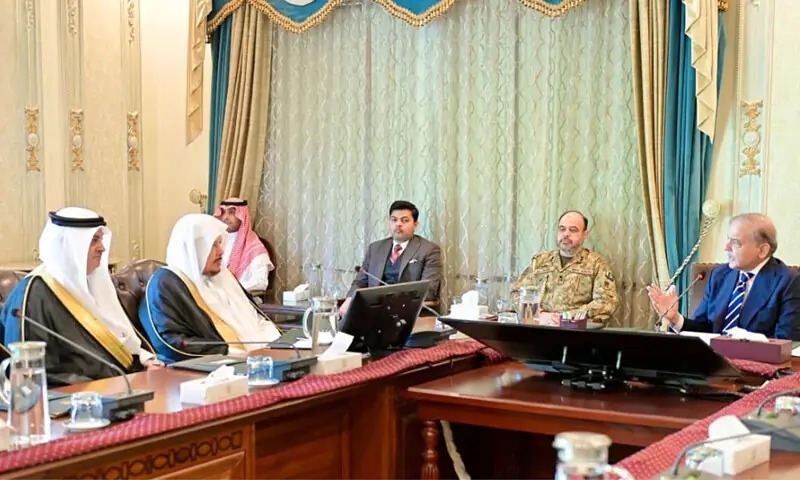
Pakistan and Saudi Arabia signed the Strategic Mutual Defense Agreement (SMDA) in Riyadh on September 18, formalizing a decades-long defense relationship between the two countries. The agreement included a clause that an attack on either country would be considered an attack on both. The joint statement stressed that the aim of the agreement is to promote defence cooperation between the two countries and strengthen common defence against any aggression. Mosaddeq Malik said in an exclusive interview, “I think this is a very comprehensive agreement that includes exchange of technology, training of forces, exchange of intelligence, preparation of joint exercises and a pledge that an attack on either country will be considered an attack on both.” He was asked whether Pakistan’s nuclear capability has also become available to Saudi Arabia under this agreement? He said that no one has raised such a question with the US and France on similar agreements they have with the UK and Portugal. This is not something that people should worry about. The aim of the defence agreement is to strengthen our security, our common security and collective security. And that is what we have done. The comprehensive spectrum means that we will strengthen each other and if someone attacks either of us, it will be considered an attack on both of us. The Minister of State said that he was also part of the delegation that was present with the Prime Minister at the time of signing the agreement. According to him, the agreement will be implemented soon, which includes technical cooperation, training of security forces and joint exercises. It would not be wrong to say that Saudi Arabia’s closeness with Pakistan began before the establishment of Pakistan. In April 1940, immediately after the approval of the Lahore Resolution, the then Crown Prince Saud bin Abdulaziz Al-Saud visited Karachi, who was warmly welcomed by figures from the Muslim League. The delegation also included five brothers of Crown Prince Saud bin Abdulaziz, two of whom, Prince Faisal and Prince Fahd, went on to become the rulers of Saudi Arabia. In 1943, the Muslim-majority state of Bengal suffered a severe famine. At that time, Muslim League leader Muhammad Ali Jinnah set up a relief camp, and King Abdulaziz Al-Saud was the first foreign figure to donate 10,000 pounds in this regard. The importance Pakistan attaches to Saudi Arabia is evident from the fact that Muhammad Ali Jinnah sent his special envoy, Malik Feroze Khan Noon, to Saudi Arabia and other Middle Eastern countries in November, two months after the establishment of Pakistan. King Abdul Aziz personally received him and also offered his royal plane for his return to Karachi. King Abdul Aziz’s successors also maintained this tradition. In 1954, before leaving for the inauguration of Saudabad, a colony built in Karachi with the support of Saudi Arabia for immigrants from India, King Saud wrote a letter to the Governor General of Pakistan, Ghulam Muhammad, in which he said that we will be happy when Pakistan becomes strong, the strength of Pakistan is our strength and if the Jews attack the Holy Land, then Pakistan will be at the forefront of those who defend it, as he has promised. In the 1960s, under the leadership of King Faisal, a strong foundation was laid for military cooperation. In the 1970s, further steps were taken for economic and military cooperation between the two countries. Saudi Arabia provided diplomatic and military assistance to Pakistan in the 1971 war. After the loss of East Pakistan, an OIC meeting was held in Lahore in 1974. During this decade, Saudi Arabia provided Pakistan with nearly a billion dollars in aid. In November 1979, a few armed men seized the Kaaba, after which the Saudi government sought help from Pakistan and France. SSG commandos were sent from Pakistan. After two weeks of continuous struggle, the Kaaba was liberated from the attackers.In the 1980s, Saudi Arabia and Pakistan allied with the United States against the Soviet occupation of Afghanistan. In his memoir, The Afghanistan File, Prince Turki al-Faisal beautifully described the mutual intelligence between Saudi Arabia and Pakistan regarding the defeat of the Soviet Union in 1989. Turki al-Faisal visited Pakistan frequently during this period. In December 1980, Crown Prince Fahd visited Islamabad to announce that “interference in the internal affairs of Pakistan would be considered interference in or an attack on the internal affairs of Saudi Arabia.” In May 1998, when Pakistan was forced to carry out nuclear tests in response to India’s nuclear tests, Saudi Arabia stood shoulder to shoulder with Pakistan. Saudi Arabia provided emergency financial assistance to Pakistan to deal with the negative effects of economic sanctions and provided oil to Pakistan on deferred payments. When a devastating earthquake struck Jammu and Kashmir in 2005, Saudi Arabia was the first country to set up an air corridor and two state-of-the-art field hospitals to provide assistance to the victims. Military cooperation between Saudi Arabia and Pakistan officially began with the signing of a defense agreement in 1967. The scope of this agreement included the deployment of Pakistani military advisors and trainers in Saudi Arabia and the provision of training opportunities for Saudi military officers in Pakistan’s military academies.
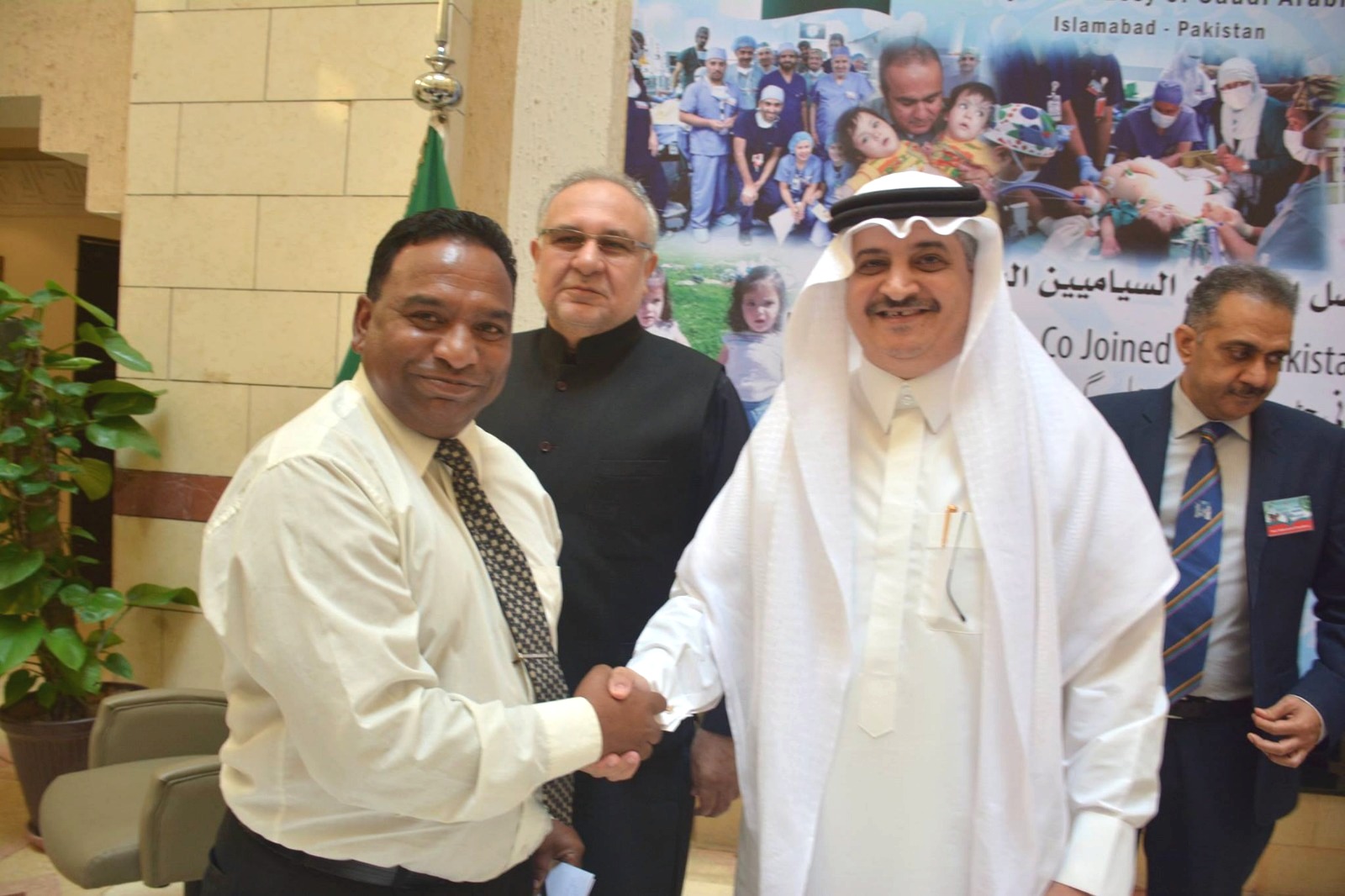
A defense agreement signed in 1982 further expanded this range of mutual cooperation, which included the deployment of Pakistani troops in Saudi Arabia for defense purposes and training, defense production, and joint exercises. This military cooperation has expanded to the global level in the past several years to control terrorism, and former Pakistani army chief General Raheel Sharif has served as the commander of the 42-nation Muslim-majority coalition against terrorism since 2017. Saudi Defense Minister Prince Khalid bin Salman was the chief guest at the military parade held on Pakistan Day last year. He was also awarded Pakistan’s highest civilian award, the ‘Nishan-e-Pakistan’, on that day. Mutual consultations have increased in view of the changing political situation in the region, such as the situation in Afghanistan, the changes in Iran-Saudi relations, and Gulf affairs. Pakistan-Saudi Arabia defense cooperation is a long-standing and mutually beneficial relationship, which has adapted itself to the various political and security needs of the region. This cooperation has strong prospects of continuing in the future, as indicated by Saudi Defense Minister Khalid bin Salman in his tweet. He said: ‘Saudi Arabia and Pakistan.. In the same row against the aggressor..’ Forever and ever. Pakistan and Saudi Arabia have signed a historic ‘Strategic Mutual Defense Agreement’, under which an attack on either country will be considered an attack on both. The agreement was signed by Pakistani Prime Minister Shehbaz Sharif and Saudi Crown Prince Mohammed bin Salman. In the agreement, the two countries have expressed their common commitment to enhance their security, achieve peace and security in the region and the world. A statement issued by the Prime Minister’s Office of Pakistan said that the aim of the agreement is to promote defense cooperation between the two countries and ‘strengthen joint defense and security against any aggression.’ The agreement said that any aggression against either country will be considered an aggression against both countries. Saudi Arabia and the Islamic Republic of Pakistan have a historic partnership, brotherhood and Islamic solidarity spanning almost eight decades, as well as common strategic interests and close defense cooperation between the two countries.



